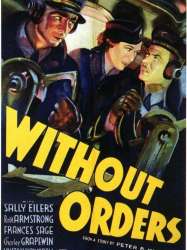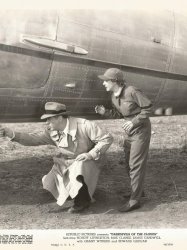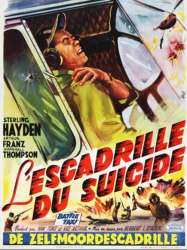Les films ayant le thème "Aviation", triés par recette

The Flying Fool (1929)
, 1h13Réalisé par Tay Garnett
Origine Etats-Unis
Thèmes Transport, Aviation
Acteurs William Boyd, Marie Prevost, Tom O'Brien, Russell Gleason, Kate Bruce

Without Orders (1936)
, 1h4Réalisé par Lew Landers
Origine Etats-Unis
Genres Drame
Thèmes Transport, Aviation, Film catastrophe, Film de catastrophe aérienne
Acteurs Sally Eilers, Robert Armstrong, Charley Grapewin, Ward Bond, Vinton Hayworth, Frank M. Thomas
At Portland, Oregon, playboy pilot Len Kendrick (Vinton Haworth) lands at the end of a cross-country record flight, met by his father J.P. Kendrick (Charley Grapewin) who owns Amalgamated Air Lines. Len is a media darling, adored by fans for his daring flights. He is in love with Amalgamated stewardess Kay Armstrong (Sally Eilers) who is dating veteran pilot "Wad" Madison (Robert Armstrong). Len dates her sister Penny (Frances Sage) who learns that his hard-drinking and recklessness has caused the death of his co-pilot. Penny knows that he was drinking before the fateful flight and only escaped prosecution by bribing a bartender. She leaves Len who ends up at Amalgamated as a line pilot, being tutored by Wad.

Sky Bride (1932)
, 1h18Réalisé par Stephen Roberts
Origine Etats-Unis
Genres Action, Romance
Thèmes Transport, Aviation
Acteurs Richard Arlen, Jack Oakie, Virginia Bruce, Robert Coogan, Louise Closser Hale, Harold Goodwin
Bert "Speed" Condon (Richard Arlen) is the star of the "Speed Condon Flying Circus". The troupe of barnstorming pilots includes "Wild Bill" Adams (Harold Goodwin), Eddie Smith (Tom Douglas) and their manager, Alec "Ma" Dugan (Jack Oakie). Performing in small towns across the country, Speed and his friends are known for their stunt flying as much as giving "joy rides" for paying customers. Speed and Eddie try a dangerous mock "dog fight" that ends with Eddie's death.

Yukon Flight (1940)
, 57minutesRéalisé par Ralph Staub
Origine Etats-Unis
Genres Action, Aventure, Romance, Western
Thèmes Transport, Aviation
Acteurs Louise Stanley, Warren Hull, Dave O'Brien, Karl Hackett, Roy Barcroft, Ernie Adams
When an aircraft from the Yukon and Columbia Mail Service crashes, Sergeant Renfrew (James Newill) and Constable Kelly (Dave O'Brien), of the Royal Canadian Mounted Police, suspect murder because they find the control stick jammed. Louise Howard (Louise Stanley), a mine owner reports that her superintendent is missing. When he is found murdered, it also is made to look like an accident.

Train Busters (1944)
, 13minutesRéalisé par Sydney Newman
Origine Canada
Genres Guerre, Documentaire
Thèmes Transport, Aviation, Documentaire sur la guerre, Documentaire historique, Documentaire sur les technologies, Politique, Documentaire sur la Seconde Guerre mondiale
Acteurs Lorne Greene
In 1943, the RCAF strength and equipment consists of 32 overseas squadrons based in England. Two fundamental missions were essential to the Allied air strategy: night bombing and interdiction. While bombers struck at the heart of occupied Europe, the German war machine reacted by sending out supplies to their far-flung European bases by rail. The RCAF disrupted the "nerve centres" by attacking the rail system. These specialized ground attack fighters were extremely successful, with fighter-bombers destroying munition trains.

Wings on Her Shoulder (1943)
, 10minutesOrigine Canada
Genres Documentaire
Thèmes Transport, Aviation, Documentaire sur la guerre, Documentaire historique, Documentaire sur les technologies, Politique, Documentaire sur la Seconde Guerre mondiale
As the Second World War continues, the Canadian contribution to the Allied bombing campaign over occupied Europe requires more aviators. The government responds by creating the Royal Canadian Air Force Women's Division in 1941. By 1943, 9,000 recruits, women from all backgrounds, are taking over a wide range of jobs. Women in the RCAF, or WDs as they were called, were clerks, drivers, photographers, air photo interpreters, weather observers, instrument mechanics, parachute riggers as well as many administrative and technical positions in the RCAF. While most WDs were located at British Commonwealth Air Training Plan stations across Canada, many others served overseas with RCAF Overseas Headquarters and

Charter Pilot (1940)
, 1h10Réalisé par Eugene Forde
Origine Etats-Unis
Genres Aventure
Thèmes Transport, Aviation
Acteurs Lynn Bari, Lloyd Nolan, Arleen Whelan, George Montgomery, Hobart Cavanaugh, Henry Victor
King Morgan (Lloyd Nolan), chief pilot for W. J. Brady Charter Pilots, Inc., and his mechanic, Charlie Crane (George Montgomery) proves he can handle any type of weather in hauling cargo. King is also a famous pilot because his girl friend, Marge Duncan (Lynn Bari) has made him the daring hero of the radio show, named after him. After a long flight from Galveston to Los Angeles delivering soft-shell crabs, King sees Marge to propose marriage. Flustered by her taking time to get ready, he drinks too much and passes out. When he revives, he heads for the Mirrado nightclub where he causes an uproar and is arrested. Marge bails him out next day but when King finally proposes, Marge makes him promise to give up flying. King surprises his boss (Andrew Tombes) by asking for a desk job, working for accountant Horace Sturgeon (Hobart Cavanaugh). Charlie ends up as King's replacement, taking over a charter contract flying ore from a Honduras gold mine.

Daredevils of the Clouds (1948)
, 1hRéalisé par George Blair
Origine Etats-Unis
Genres Drame, Thriller, Action, Aventure, Romance
Thèmes Transport, Aviation
Acteurs Robert Livingston, Mae Clarke, Grant Withers, Edward Gargan, Ray Teal, Jimmie Dodd
Trans-Global Airlines president Douglas Harrison (Pierre Watkin) wants to force Terry O'Rourke (Robert Livingston), and his rival Polar Airways out of business. When Kay Cameron (Mae Clarke) asks for a job, Harrison connives to have her infiltrate O'Rourke's operation in his Edmonton, Alberta headquarters. She is assigned to work on the official documents required by Jimmy Travis (Russell Arms), a Canadian customs official. Soon after, a Polar Airways flight encounters trouble when an oil line breaks. Radio operator, Eddy Clark (Jimmie Dodd) talks O'Rourke down through a thick fog. O'Rourke decides not to report the accident and the damage to his aircraft, afraid his insurance company will cancel the policy, jeopardizing his lucrative Canadian government contract to haul gold ore.

Wasp Wings (1944)
, 42minutesOrigine Canada
Thèmes Transport, Aviation, Documentaire sur la guerre, Documentaire historique, Documentaire sur les technologies, Politique, Documentaire sur la Seconde Guerre mondiale
Starting in England in 1943, Royal Canadian Air Force Spitfire fighter Wings that belong to the RAF Second Tactical Air Force (2TAF) were preparing for deployment to overseas bases. Using the fast and agile Spitfire in a number of different Marks, the 2TAF aircraft provided close air support as well as engaging the Luftwaffe in aerial combat. The Spitfire Wings "played an essential part in a swift-moving, deadly striking air force." The success of the RCAF Spitfire units was due to both aircrew and ground crew that not only set up the tactical airfields but kept the aircraft serviced. The first group sets up in Italy, then other wings are attached to the units committed to the Normandy campaign, with temporary bases established in France, Belgium and Germany from 1944 to 1945. In the last months of the Second World War, 2TAF begin to relax as their missions come to an end.

Canada's Air Defence (1956)
, 33minutesOrigine Canada
Thèmes Transport, Aviation, Documentaire sur la guerre, Documentaire historique, Documentaire sur les technologies, Politique
In 1956, No. 433 "Porcupine" RCAF Squadron flies the Avro Canada CF-100 Canuck all-weather interceptor aircraft. The squadron is based at CFB North Bay, Ontario, and is responsible for an area that includes the immediate region and the Arctic. On a deployment to CFB Cold Lake, Alberta, where training for RCAF operational units takes place, experienced flight crews and newcomers in the squadron learn how to be more effective as a team. The work of the ground control and radar units that support the squadron are highlighted in a combat readiness exercise.

Birth of a Giant (1957)
, 29minutesOrigine Canada
Thèmes Transport, Aviation, Documentaire sur la guerre, Documentaire historique, Documentaire sur les technologies
In 1954, the RCAF issues specifications for a new maritime patrol and anti-submarine aircraft. In order to comply with the RCAF's requirements, the Canadair aircraft company in Montreal, begins a re-design of the Bristol Britannia airliner. A prototype of the giant aircraft begins to take shape alongside the other aircraft in production at the Canadair factory. As each individual component is designed and tested, the aircraft given the company designation, CL-28, proves to be a complex technological challenge. Many of the specialized parts are sent to sub-contractors who have to meet stringent timelines and quality standards. As problems arise, computer analysis is available to provide solutions.

L'escadrille du suicide (1955)
, 1h22Réalisé par Herbert L. Strock
Origine Etats-Unis
Genres Drame, Guerre
Thèmes Transport, Aviation
Acteurs Sterling Hayden, Marshall Thompson, Arthur Franz, Jay Barney, Michael Colgan
Capitaine. Russ Edwards commande une unité de sauvetage d'hélicoptère qui volent des soldats blessés hors des zones de combat et les pilotes de sauvetage qui doivent abandonner leurs avions. Il a un problème avec l'un de ses hommes, l'ancien pilote de chasse le lieutenant Pete Stacey, qui prend des risques inutiles avec son hélicoptère. Stacey est frustré d'avoir à piloter des hélicoptères pilotes au lieu des avions et veut sortir. Les pilotes d'hélicoptère sont rares mais qui signifie qu'il n'a aucune chance d'être transféré. Sous la pression de son commandant d'escadron de réduire le nombre d'hélicoptères de commission pour les réparations, Edwards fait de son mieux pour obtenir Stacey sur le côté. Il vient finalement autour.

Bailout at 43,000 (1957)
, 1h18Réalisé par Francis D. Lyon
Origine Etats-Unis
Genres Drame
Thèmes Transport, Aviation
Acteurs John Payne, Karen Steele, Paul Kelly, Richard Eyer, Constance Ford, Eddie Firestone
This script must be run from the command line

Destination 60,000 (1957)
, 1h5Réalisé par George Waggner
Origine Etats-Unis
Genres Drame
Thèmes Transport, Aviation
Acteurs Preston Foster, Patrick Douglas "Pat" Conway, Jeff Donnell, Coleen Gray, Robert Clark, Denver Pyle
A new experimental aircraft, "The Dream" is the pride of the Buckley Aircraft Corporation. Owner Colonel Ed Buckley (Preston Foster), has designed and built a prototype that his former wartime flying buddy, Jeff Connors (Pat Conway), wants to fly. Buckley's wife Ruth likes Jeff, who is godfather to their son "Skip" (Bobby Clark). Test flying is dangerous work, and Jeff has to learn how to fly to supersonic speeds, coached by Mickey Hill (Denver Pyle). Ed's secretary, Mary Ellen (Coleen Gray), is another reason for Jeff to want to join the company.

Birds of Prey (1973)
, 1h21Réalisé par William A. Graham
Origine Etats-Unis
Genres Thriller, Action
Thèmes Transport, Aviation
Acteurs David Janssen, Ralph Meeker, Don Wilbanks
A former American Volunteer Group pilot, Harry Walker (David Janssen), who flies a Hughes 500C helicopter for Salt Lake City radio station KBEX as a traffic reporter, is introduced doing an afternoon rush-hour report during a station nostalgia promotion in which standards from the World War II era are being played on air. Opening credits run over aerial combat footage borrowed from the 1942 Republic Pictures film Flying Tigers, then segues into footage of a P-40 Warhawk in full sharkmouth scheme being towed along the highway to the radio station by Walker as part of the promotion.
 Connexion
Connexion